
19 minute read
16
RUSTLERS VOLLEYBALL a family tradition
For the Nelson family, the green and gold of Lakeland College Rustlers volleyball run deep through their veins. Jarret Nelson, a second-year agribusiness student, is a second-generation Rustler. He followed in the footsteps of several of his family members when he put on the Rustlers volleyball jersey for the first time in September 2019.
Growing up on his family’s 200-head cow/calf farm by Veteran, Alta., Jarret's reason for choosing Lakeland did not originally include volleyball.
“I chose Lakeland for the ag programming and the smaller classes,” Jarret said. “Making the men’s volleyball team and being able to continue on in a sport I loved in high school was just a bonus.”

Jarret was introduced to volleyball at a young age. It was a sport both parents competed in at the post-secondary level. His mother Julie played for three years, from 1995 to 1998, at Mount Royal College. She was part of the Cougars teams that competed at the Canadian Collegiate Athletic Association national championships for two out of the three years. Jarret's father Todd attended Lakeland from 1995 to 1997. He competed for the
Rustlers while working towards his livestock diploma. Todd had a promising first year but was sidelined in his second season due to an injury. Jarret’s Aunt Kim (Hadwin) and Uncle Graeme (Thain) met at Lakeland College where they also competed for the Rustlers volleyball teams from 1993 to 1995. Jarret also indicated his mom’s cousin Scott Mckenzie played volleyball for the Rustlers from 2001 to 2004.
“When I talk with my uncle and aunt, they ask me how things are going at college,” Jarret stated. “We kind of laughed when I told Aunt Kim that Peter Walsh, one of their instructors, also teaches me. Every once and a while, Peter will call me Todd, I guess I remind him of dad. The college is such a great environment where people know who you are, and it feels like everyone is there to help you.” Todd coached Jarret through his entire secondary school playing years. He first coached the junior high team and then moved on to coaching the Consort boys’ volleyball team when Jarret moved on to high school. “Jarret was an easy kid to coach,” Todd commented. “Maybe because he felt he had to work harder being the coach’s kid, but I like to think it was because he had a strong work ethic.”

When it came to trying out for the Lakeland team, Jarret did not have some of the highlevel playing experience that some of the others who tried out did, but the coaching staff must have seen something they liked. Jarret’s playing time was limited in his first year, but he still enjoyed his experience. “The group of guys on the team are just fantastic people they are like a second family,“ Jarret said. “This year with COVID-19, it has been challenging but I think our team is even closer as we have had to hold each other accountable to work harder and find different ways to stay in shape.” At this time, Jarret is unsure if he will continue with his education and enrol in the new bachelor of agriculture technology program, but he is enjoying both the classroom and volleyball experience right now.
When asked if he believed he is a better player today than his dad was in his day, he hesitated and then said, “Well, I don’t know for sure but it is probably in my best interest right now to not answer that question if dad is going to read this. I can probably say though that we both enjoyed our time at Lakeland.” Making the men’s volleyball team and being able to continue on in a sport I loved in high school was just a bonus.
Building resilient wellness

Sarah Popil’s Lakeland College journey began long before she became its wellness advisor in 2020. She started out as a Lakeland student and took a winding journey to the position she holds now, one which helped her develop a deeper understanding of the various challenges facing students today and the many resources available to help them find their way.
From Vermilion, Alta., Popil graduated from St.
Jerome’s Catholic School without a clear idea of what she wanted to do. She went straight to work for four years, saving up to go to school and enrolling in Lakeland’s educational assistant program.
“I went on practicum at the high school after my first semester,” Popil says. “They offered me a position and I knew it was too good of an opportunity to turn down, despite not having finished my program. Lakeland had just started offering online programming so I was able to finish my educational assistant certificate while working, which was the beginning of my education journey.”
The most important thing I could say to students who need help but aren’t sure about reaching out is to just take that step. Don’t be afraid to reach out for help.

The challenges of balancing full-time work and full-time studies were tricky but taught her a lot of the resiliency she would eventually return to Lakeland to share with new generations of students. While working with high school students with learning disabilities, behavioural issues and other special needs, Popil discovered she had a talent for helping these students. Though passionate about her work, she was ready for a new challenge. “I had realized I had a knack for problem solving and helping students build their own skills,” Popil explains. “And as much as I loved it, I’m a big believer in growth and personal/ professional development. I would have loved to stay at the high school for the rest of my life, but I decided to earn my child and youth care diploma and pursue higher education.” Before she even finished her diploma, Popil enrolled in Athabasca University’s bachelor of professional arts program, with a major in human services. As she finished her diploma, she was already taking university-level courses at the same time.
“It was hard,” she confesses. “I worked my butt off. There were some moments where I just couldn’t see the end, but it’s so amazing when you finally get there. I learned so many hard lessons and certainly hit some walls. I think some of the difficult things I encountered help me understand the struggles other people can go through and it guides me in the work I do now.
“Tough experiences do not discriminate, no matter who you are. How we choose to deal or cope with these losses is what either builds us up or hinders us. We can’t change the past and it’s important to place emphasis on the things that you can control rather than what you can’t. Surviving hardships can teach you important things about yourself and the world around you. Difficulties help you to strengthen your design, hardships will help you expand your empathy and with time, you will evolve and grow as a person.” Before accepting the position as wellness advisor at Lakeland, Popil worked as a social/ emotional coach with younger children for five years. “It was really hard to leave those children and the community I had built there. But if you see an opportunity, you have to go for it. I had a really positive student experience at Lakeland. There was so much support from staff who helped me succeed. They saw something in me and helped me nurture it. As a long-term resident of Vermilion, I really wanted to come back to
Lakeland to work.”
Popil took the position in January 2020 and hasn’t regretted it. “Every single day looks different for me,” Popil explains. “At first, I was focused on organizing and planning activities and events for students. I would go into classrooms and give presentations on stress management and coping, talking with students and helping them solve a variety of problems.” Popil focusses on helping students develop resiliency in all the dimensions of wellness – physical, mental, social, financial, academic and spiritual. She shares strategies and resources with students to help them navigate the challenges they are
facing, and offers referrals to other agencies that can give additional support, working alongside the campus counsellors. “My goal is to help students build resiliency. It’s helping them find their way, find the balance and happiness that lives within themselves. It’s building their capacity for overcoming difficulties, building mental toughness and skills.” Since the pandemic began, Popil has found an increase in student need, though the challenges they are facing remain the same. “Many students are anxious and they’re finding it difficult to manage stress given all the uncertainty.” Popil does her best to work with students one-on-one when she can to help students feel connected, always keeping health and safety protocols in mind. The biggest challenge for her is knowing that she can guide students to the resources they need and the paths that might help them, but it’s up to them to put in the work and create their own motivation for change and self-efficacy. Her role is to be patient and to support them on that journey.
The biggest challenge for the students, Popil says, is asking for help.
“The most important thing
I could say to students who need help but aren’t sure about reaching out is to just take that step. Don’t be afraid to reach out for help. It’s an important part of self-care and change begins with you. Everybody’s going to experience something and it’s important that we have the ability to ask for help and receive the help we need. It’s okay to ask for help. It’s why we’re here.” Popil explains that self-care can be more than taking care of our physical bodies and treating ourselves well. “Wellness is about more than being free from sickness,” Popil says. “It’s a spectrum, finding an overall balance for your physical, mental, social, academic, environmental and spiritual wellbeing. It’s about the way we live our everyday life.”

ALUMNUS AMONG BEST DESIGNERS OF 2020
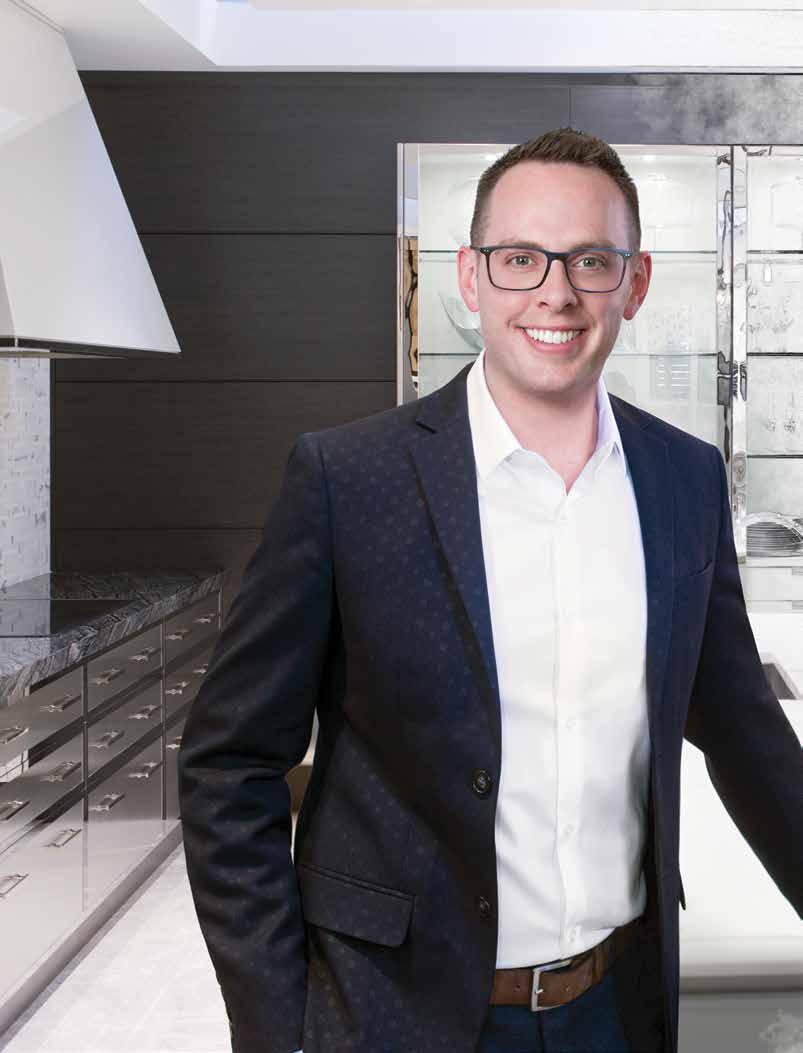
Lakeland College’s commitment to real-world learning opportunities have shaped many students and alumni, including award-winning alumnus Mark Cayen.
The National Kitchen and Bath Association (NKBA) recently awarded Cayen, a Class of 2005 interior design technology alumnus, third place in the Large Traditional Kitchen category at the NKBA Design Awards in February. The NKBA’s October 2020 edition of their Inspiration + Innovation magazine also featured Cayen. “Winning third place means a lot because my design was recognized by my peers. This year makes this win unique because the event was virtual, and everyone was socially distanced. They would’ve looked at each design and evaluated it among themselves,” he says. “I love the kitchen. It has to be one of my favourite kitchens that I've ever designed.” Throughout his 15-year career, of which 12 years have been with Empire Kitchen and Bath (EKB) in Calgary, Alta., the senior design consultant believes he’s designed approximately 320 kitchens. "What I like about interior design is that no two spaces are ever the same and no two clients are ever the same.”
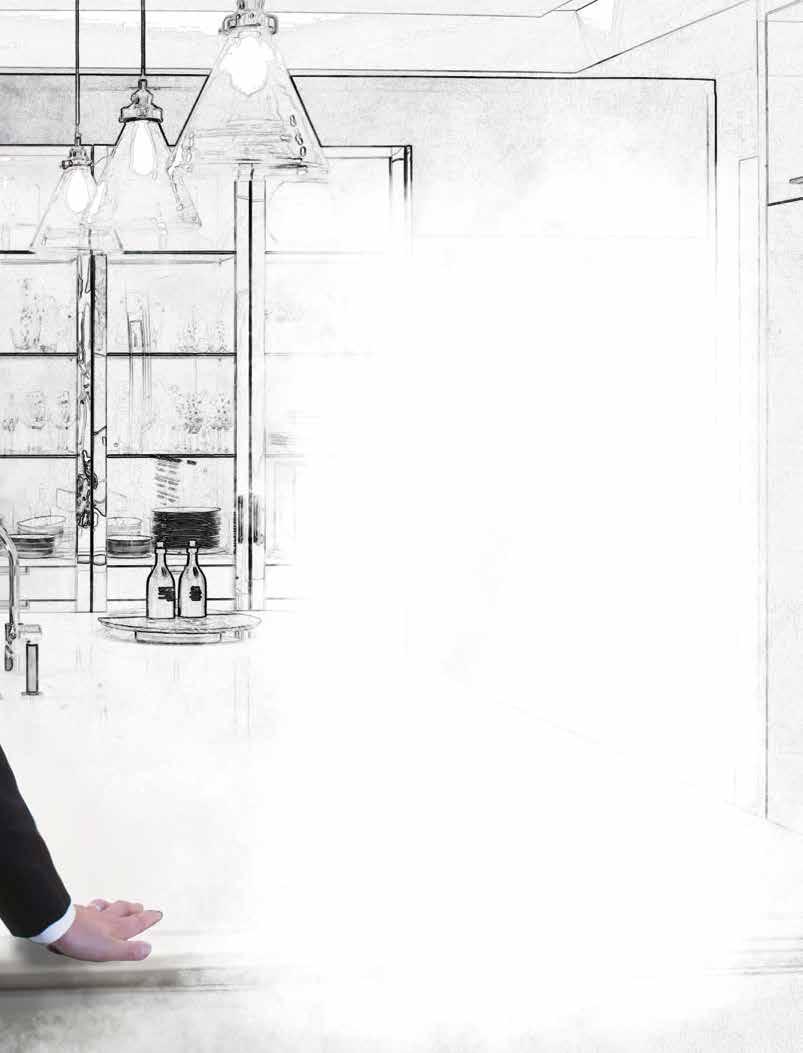
As a design consultant, Cayen’s designs are well thought out and cohesive, from analyzing a space’s function to utilizing his specialty in custom cabinetry and coordinating with tile, plumbing and lighting. However, Cayen stressed that collaborating with other designers is key to a successful design, which he learned early on at Lakeland. “Lakeland’s instructors encourage collaboration, which is something I always tell people. There was an opportunity for individual and group work, which is how the job gets done in the industry. In the final months of the program, I also completed a practicum with Legacy Kitchens and that was an eye-opener of how the world works.
“With this design, I met with the clients all the time, but I had other interior and kitchen designers providing feedback. Then, you have a cabinet maker and a team of installers bringing your design to life. A design might be perfect on paper, but what transpires into real life could be different. Working in a collective is something that I never considered when I enrolled at Lakeland but working with my instructors and classmates on projects was at the forefront. You need a lot of support to be successful in this line of work.” With EKB, Cayen continues to collaborate with Lakeland by offering practicum placements for Lakeland’s interior design technology students, including Emily Hartley. She graduated from Lakeland in 2019 and placed first in the 2019 NKBA student design competition for her kitchen design. “It is important to support the next generation of designers because we need to all work together and two minds are always better than one,” Cayen says.
ALUMNA’S DREAM CAREER REALIZED AFTER TAKING RISKS
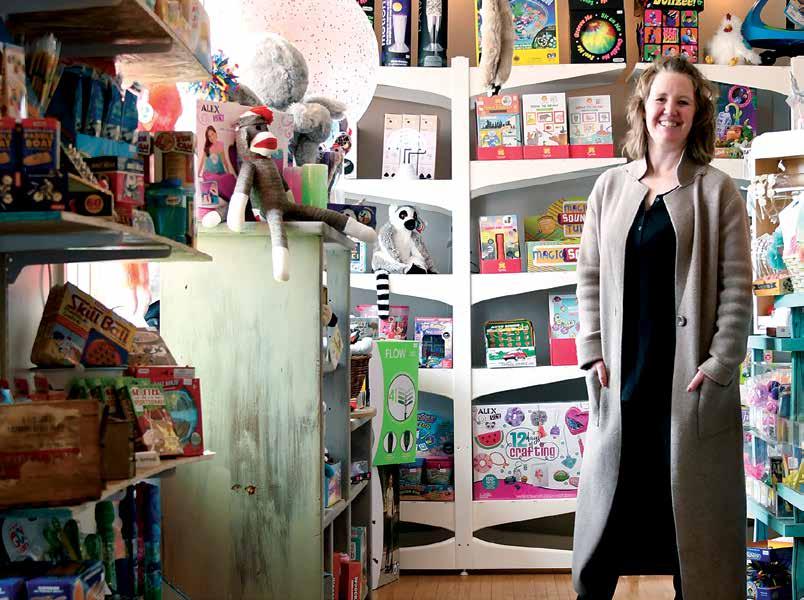
This Lakeland College alumna’s career is soaring thanks to faith, taking chances and having a whole lot of heart.
At the northeast corner of 46 Street and 52 Avenue in Lloydminster, Alta., there’s a worn bench that Delia Morgan-Tetz often occupied in the early years of her working career. While she enjoyed her morning coffee and the occasional lunch break, she’d manifest visions of owning the little white house situated across the intersection.
“I used to stare at the house and dream about what I could do with it. It always bothered me that I didn’t own it, so I bought it when I had the chance,” says Morgan-Tetz. Morgan-Tetz graduated from Lakeland’s marketing program when it was offered at the Vermilion campus in 2002. After a few years in the workforce, she earned an advanced business administration diploma as well as a bachelor of commerce through Athabasca University in 2007. After purchasing the house and renting it out to tenants for years, the economic downturn in 2015 gave Morgan-Tetz the push to retrofit the dwelling into 900 square feet of fun and move in her nomad business, Walkn on Water Toy Shop, which officially opened in July 2017. “I know there are so many more entrepreneurs like myself out there who have ideas and dreams. But I remember reading once that a dream is always a dream unless you put it into action. For years I was stuck in the dream of never moving forward. There’s risk in it all, and you have to want to take the risk. I’m happy I did.” Before the little white house, MorganTetz established Walkn On Water at trade shows across the region. She then grew her business model and utilized an old school bus, which she would drive to summer events on weekends. This earned her the nickname Ms. Frizzle.
Morgan-Tetz ran the business in a part-time capacity – consistently torn between making a living based on stability or a dream. “There’s safety in a full-time job with decent pay and benefits,” she says.


As the business grew, so did MorganTetz’s desire to be at the store. She hired part-time workers to help with the daily operations when she was at work and then worked in the evenings. “I had a full-time job making good money with health benefits, so dropping that to pursue this full-time took a big leap of faith. Hence why it’s called Walkn On Water. I’ve trusted God through this whole time. “I wanted to give my full-time job 100 per cent, but the more the shop grew, the more my heart wanted to be there. It was so empowering to finally say I’m just going to trust God with all this and give this business my undivided attention.”
The unique toy shop has always boasted an eclectic selection of toys, games, books and more because of Morgan-Tetz’s passion for people of all ages and her love for fun. Equipped with the learning opportunities from her grandparents’ and parents’ experiences running department stores, Morgan-Tetz is happy to be building on her family’s retail legacy and venturing out on her own. “I think that’s why my business is thriving because I’m here now. I can listen to what my customers want and see their reaction to the toys I put so much effort to bring in.” Even with expanding her business by opening a Wainwright, Alta. location in 2019, Morgan-Tetz says the business has never been better since the COVID-19 pandemic started. “There’s a huge push to shop local right now, and that has helped us. I’ve found people are looking for that intimate shopping experience, and people aren’t traveling to the bigger centres for special occasion gifts. I think we’ve been able to cater to that.”
Morgan-Tetz says the homestead is almost at capacity and is excited about future opportunities to expand the current space. “I didn’t wake up one day and decide this is what I’m going to do for the rest of my life. I’m sure many entrepreneur stories are like mine and that we stumble into our careers with a passion. It’s amazing what happens when you put heart and logic together.”
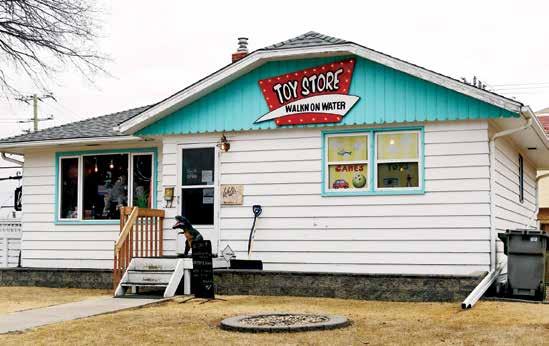
Ryan Baker was four years into a job when he realized he wanted to make a change.
Through hard work, dedication and a little bit of luck, he made his dreams come true in 2020, opening Studebaker Industries Ltd., a repair shop in Mannville, Alta.
“I was working up by Smokey Lake. It was very cold, with heavy snow blowing sideways,” says Ryan. “I caught a glimpse of myself in the reflection in the window, and said to myself, ‘I don’t want to be here when I’m 30’.” That moment proved to be the catalyst that set him on the path to his career in equipment repair. His father had graduated from heavy duty mechanics at Lakeland College and Ryan had always had an interest in anything mechanical, so he followed in his father’s footsteps. He completed the heavy duty equipment program in 2009 and then finished the automotive program in 2012, becoming a Red Seal endorsed journeyperson in both trades by age 30. “Lakeland was excellent,” Ryan says. “The whole faculty at Lakeland and the Trades Centre were great. Everybody had a general attitude that we were all there to succeed. I also believe the awards program at Lakeland deserves recognition. The attitude of striving for excellence and being recognized for your efforts is what keeps students pushing for the best they can do. Without support, these programs won’t continue and they were a huge help when I was going to school with a young family and a subpar employment insurance program. I’m thankful to the sponsors of the program and encourage fellow alumni to get involved.” After graduating from Lakeland, Ryan and his wife Joanna launched their service truck small business StudeBaker Industries Ltd. in 2011. Along with running his service truck, Ryan joined the faculty at Lakeland in 2014 as an automotive career and technology studies (CTS) instructor. Though he enjoyed the opportunity to teach, balancing both proved a bit of a struggle. “It was a challenge, teaching CTS for a week at a time, for full days,” Ryan explains. “I’d put my day in at the college and spend another six hours after in the service truck working on my business.” In 2017, Ryan was forced to make a choice. His business was getting busier and splitting his time between Lakeland and his service truck wasn’t sustainable anymore.
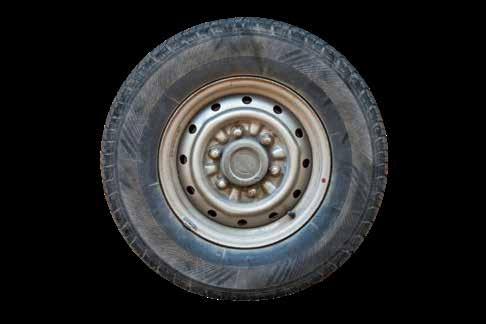
“I had to make a choice, pursue a career at Lakeland or finish what we started in 2011. I came to a fork in the road where I either had to stop answering the phone and taking on new clients or accept the way things were going and expand. Entrepreneurial spirit guided me in my choice.” He and Joanna decided to expand and Ryan left his position at Lakeland. After the owner of Frank’s Field Service outside Vermilion passed away and his sons were closing up the business, Ryan went to the shop to see if they were selling any equipment and tools. “I ended up walking away with a lease agreement on their shop yard space and all the tools in it,” he says. “Right there, in the span of a week, I went from being on my own with a service truck and no employees to suddenly leasing some space and needing to hire some employees. We hired two that first week and have been growing ever since.”
Ryan and Joanna ended up working in that space for two years, though they knew within two months that they’d need something bigger. “We had potential to build,” Ryan says. “We started plans on building a new shop. It took two years to convince the banks we had a real plan and a vision. We just needed some help to get started.” In Dec. 2019, the financing came through and construction started in Mannville, finishing up in May 2020. StudeBaker and their employees have settled into the new shop. It’s already filled with repair jobs and passion projects, everything from airplanes to lawnmowers and pickup trucks, as well as restoration vehicles. “We repair anything with an engine, anything that moves. That’s what sets us apart from other repair shops – diversity. We’re not afraid to take on anything. I’ve always had the mindset that it doesn’t matter what the scale of the machine is, they’ve all got the same basic principles. It’s just a different application.” That willingness to take on any challenge is something Ryan picked up at Lakeland and one of the main philosophies of StudeBaker. “Lakeland really helped me learn to keep an open mind,” he explains. “It’s the mindset of a lot of the instructors I had the privilege of working with. You’re not expected to know everything, but as long as you can think your way through the principles and apply them to your situation, you can get through anything. That’s the mindset they gave me at Lakeland and that’s the mindset I continue to cultivate in our business. It’s done nothing but work well for us. We may not have done everything, but we are willing and able to learn anything.”










